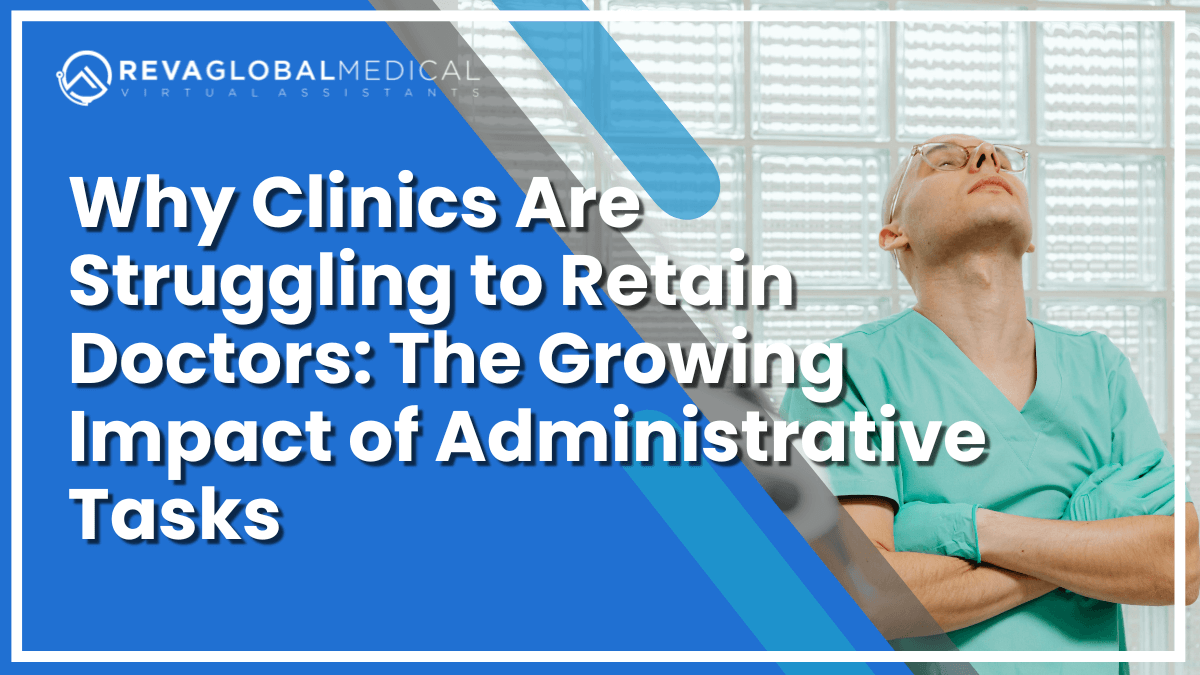Why Clinics Are Struggling to Retain Doctors: The Growing Impact of Administrative Task

In recent years, many clinics and hospitals have faced a concerning issue: physician retention. Doctors, the lifeblood of any healthcare facility, are increasingly overwhelmed with administrative tasks, leaving them feeling burnt out, frustrated, and, in many cases, leaving the profession altogether.
As the healthcare industry becomes more complex, the balance between providing quality care and managing administrative workloads becomes more challenging.
One solution that has emerged as a lifeline to help alleviate this burden is the use of virtual health assistants.
The Growing Problem: Administrative Tasks and Burnout
Doctors are drawn to medicine to help people, not to spend countless hours on paperwork, billing, scheduling, and other administrative duties.
Yet, these administrative responsibilities have become a significant part of their daily lives. According to a study by the American Medical Association (AMA), over 40% of physicians report experiencing burnout due to administrative tasks.
This heavy workload is contributing to a growing number of physicians leaving their positions and, in some cases, leaving the profession entirely.
The issue is particularly pronounced in private medical practices and smaller clinics, where resources are often limited, and administrative responsibilities can overwhelm medical staff.
Doctors, who are trained to diagnose and treat patients, are spending more time on clerical tasks that take away from the very reason they chose medicine in the first place – to care for patients.
The Administrative Burden
The shift towards electronic health records (EHR), insurance verifications, appointment scheduling, and patient follow-up has significantly increased administrative workloads for physicians.
What was once a manageable set of tasks has now become a full-time job in itself. For many physicians, their day no longer ends when the last patient leaves.
Instead, they find themselves catching up on paperwork, dealing with insurance claims, and ensuring compliance with ever-evolving regulations.
This administrative burden is often more intense in smaller clinics and practices, where a single doctor might have to juggle all these tasks alone or with minimal help.
According to a 2021 MedPage Today article, nearly 70% of physicians reported that administrative tasks detract from their ability to provide patient care.
The Emotional Toll on Doctors
For many doctors, the emotional impact of these administrative burdens is devastating. These tasks take away from the meaningful interactions they have with patients, leaving them feeling disconnected and disillusioned with the profession they once loved.
Burnout, depression, and anxiety are becoming increasingly common among healthcare professionals as a result of the overwhelming workload.
Moreover, many doctors report feeling like they are working in a system that values bureaucracy over patient care, which undermines their passion for medicine.
Virtual health assistants can provide a solution to this crisis by taking over many of the time-consuming administrative tasks that weigh down physicians.
The Solution: Virtual Health Assistants
Virtual health assistants are changing the game for physicians and clinics alike. These trained professionals can handle a variety of administrative duties, from managing patient appointments and insurance verifications to handling phone calls and follow-up communications.
With virtual health assistants, physicians can focus on what matters most—patient care.
The beauty of virtual health assistants lies in their flexibility and scalability. Clinics and practices can hire them on-demand, eliminating the need to hire full-time administrative staff. This not only reduces costs but also helps to improve efficiency and patient satisfaction.
By taking administrative tasks off the plate of doctors, virtual health assistants allow physicians to regain control of their time and, most importantly, their emotional well-being.
The emotional toll that administrative tasks take on doctors is one of the driving forces behind burnout. When doctors can spend more time with patients and less time on administrative burdens, their job satisfaction improves, leading to greater retention rates in the industry.
How Virtual Health Assistants Help Alleviate the Stress
The role of virtual health assistants is more than just a convenience; it’s a necessity in today’s healthcare environment. These assistants are equipped with the skills and knowledge to support physicians by handling a wide range of tasks, including:
- Appointment Scheduling: Virtual health assistants can manage appointment calendars, ensuring doctors can see patients without being bogged down by phone calls and last-minute cancellations.
- Patient Communication: They can manage follow-up calls, appointment reminders, and patient queries, allowing doctors to focus on in-person care.
- Insurance and Billing: Virtual assistants can handle billing inquiries, insurance claims, and payment processing, ensuring that doctors don’t have to dedicate time to these often complex and time-consuming tasks.
- Electronic Health Records (EHR) Management: Virtual health assistants can assist in updating and organizing patient records, reducing the amount of time doctors spend entering data.
By outsourcing these tasks, physicians regain precious hours in their day, which can be spent with their patients or on personal time.
This shift in workload alleviates stress, helping doctors reconnect with the reasons they went into healthcare in the first place.
Streamline your practice with a Medical Virtual Assistant
By utilizing a Medical Virtual Assistant, you can free up your time and ensure that your medical practice operates efficiently
A Path Forward: The Importance of Virtual Health Assistants in Retaining Doctors
As physician burnout continues to rise, clinics and hospitals must take action to address this crisis. Virtual health assistants offer a viable and cost-effective solution to the growing administrative burdens that are contributing to physician dissatisfaction.
By integrating virtual health assistants into their practices, healthcare providers can not only improve patient care but also enhance doctor retention. The administrative load is a key factor in burnout, and by reducing this burden, clinics can retain their most valuable asset— their physicians.
The administrative burden is one of the leading causes of physician burnout and turnover, and the strain it places on healthcare providers is only growing. Fortunately, virtual health assistants offer a solution that helps alleviate these challenges, providing relief to overworked doctors.
By embracing this technology and shifting administrative responsibilities to virtual assistants, clinics can create a more sustainable and supportive environment for their doctors. As a result, physician retention will improve, leading to better patient care and a healthier healthcare system for all.
Sources
- American Medical Association (AMA) – Physician Burnout Statistics
- MedPage Today – Administrative Burden and Physician Burnout
- Journal of the American Medical Association (JAMA) – Administrative Tasks in Healthcare
By reducing administrative tasks with the help of virtual health assistants, physicians can refocus on their passion—providing exceptional care to their patients.
If you’re ready to scale your practice, save time, and improve efficiency, schedule a schedule a strategy session today.
Let us match you with the perfect medical virtual assistant and set your practice up for success!
Schedule Your Strategy Session!
Grow Your Brand With Trained Virtual Assistants
Get the help you need to take your brand and business to the next level.
Not Sure What Tasks To
Start Outsourcing?
We’ve got you covered.
Download our free guide to help you get started.


